This is an accordion element with a series of buttons that open and close related content panels.
Why is it important for health system pharmacists and other clinical professionals to learn about opioid stewardship?
To promote the highest quality of care and be in line with best practices, health systems must offer all clinical professionals opportunities to build and maintain up-to-date knowledge of the medical and scientific evidence about opioid prescribing and related topics.
National quality, accreditation, and regulatory authorities recommend or require that health systems or hospitals provide staff with educational resources related to opioid stewardship:
In 2018 & 2019, the Joint Commission released new and revised Pain Assessment and Management Standards for hospitals, critical access hospitals, and ambulatory care organizations. Each standard has a similar new requirement that these organizations must provide practitioners with resources to improve their competence related to pain management and the safe use of opioids.
Requirement – EP3: The hospital provides staff and licensed independent practitioners with educational resources and programs to improve pain assessment, pain management, and the safe use of opioid medications based on the identified needs of its patient population.
Provider competence is stressed in clinical practice guidelines, regulations, and by experts in the field. Providers are expected to be knowledgeable about multiple modalities of pain treatment, early identification and prevention of harms of opioid therapy, and management of patients with complex needs. However, providers report insufficient training in pain management and opioid prescribing. The organization can increase provider competence in pain management by providing access to effective education resources.
Pharmacists can refer to this requirement when seeking buy-in from leadership regarding opioid stewardship education for all staff and practitioners.
In a 2020 publication focused on opioid stewardship measurement, the American Hospital Association (AHA) offered the following ‘Considerations about Prescriber and Care Team Education’:
Considerations for Prescriber and Care Team Education
An important lever for mobilizing change in your organization is providing education to care teams and prescribers. Education should include updates along with training on new or revised organizational guidelines and should address stigma as well as personal biases.
Many states mandate education on opioids for prescribers. Most organizations require attendance and completion of learning regarding opioid utilization and pain management. When considering education for prescribers and care teams, some essential points to address include:
- The link between overprescribing and opioid dependency in individual patients
- The link between overprescribing and diversion of opioids into the community
- The mismatch between postoperative prescribing and patient actual use and need
- Identifying medical conditions that put patients at high risk for dependency
- The limited data that supports opioids for chronic pain
- How to use opioid alternatives
It is important for pharmacists to be aware that in Wisconsin, physicians with a Drug Enforcement Administration number are required to complete 2 CME credits related to opioid prescribing. While there is not a corresponding requirement for pharmacists from the Pharmacy Examining Board, pharmacy teams can refer to this requirement when presenting to health system leadership about the rationale for opioid stewardship and the role they can potentially play in pharmacist-delivered provider education.
The Wisconsin Medical Examining Board (MEB) approved a rule requiring physicians with a Drug Enforcement Administration number to complete two CME credits related to its Opioid Prescribing Guideline during each CME cycle.
- To assist physicians in identifying educational courses to meet the requirements, the Wisconsin Medical Society developed a series of on-demand webinars designed to address the challenges faced by physicians and other prescribers and to improve opioid prescribing practices without compromising the quality of patient care.
- The MEB also provides a list of other approved opioid prescribing courses.
- The Wisconsin Department of Health Services provides a list of resources and information to help all health professionals prevent misuse, provide quality treatment and recovery services, and reduce death and harm. This includes both state and national trainings.
How can pharmacists develop and provide education about opioid stewardship for their medical staff?
Pharmacists have an important role to play in educating health system providers and frontline medical staff about opioid stewardship. A 2019 study summarized the current involvement and impact of pharmacists in helping to address the crisis and highlighted strategies pharmacists may use to address opioid crisis. An identified role for pharmacist was to educate other healthcare professionals, including:
- Education of prescribers and other health professionals concerning appropriate pain and opioid management
- Provision of academic detailing
- Recommendations to prescribers prior to issuing prescriptions (or prior to dispensing)
American Hospital Association (AHA) suggested the following approaches that opioid stewardship teams (including pharmacists) could consider for providing opioid stewardship education.
Identified educational strategies include:
- Recorded on-demand learning modules that can be assigned to individuals and easily tracked for completion.
- Live presentations, like grand rounds or lunch and learns, that can be approved for continuing education.
- Posters and project dashboards to create visual reminders of the ongoing work.
- Pocket cards or quick reference guides that can aid prescribing, patient education and utilization of appropriate diagnosis codes.
- Links to educational materials within EHR order sets that can provide easy and timely access at the point of care.
- Internal or external social media campaigns that can quickly share patient-centered care and care team success stories.
- Training key team members to become “opioid prescribing liaisons,” which offers rapid dissemination and a level of expertise at critical organizational touchpoints. (AHA, 2020)
Academic detailing
A notable strategy for pharmacists to educate medical staff within a health system or hospital about opioid stewardship is to use academic detailing. This approach involves the educator visiting with a clinician to understand their unique experience and needs and then tailoring the evidence-based information accordingly. It is based on the idea that the educator (e.g., pharmacists) can provide the clinicians with needed support, tools, and most importantly, up-to-date evidence about a particular topic, such as opioid stewardship.
Pharmacists have been successful at using an academic detailing approach to promote messages about safer opioid prescribing. This study suggests that a single pharmacist-led academic detailing visit may be an effective tool for increasing physician voluntary registration and utilization of data on patients’ prescription history contained in a state prescription monitoring program.
duration:
00:03:01
Listen to Audio Clip
Description of a pharmacy-led opioid stewardship team using academic detailing for pharmacist-provider education
Clip from Podcast with Nicole Green, Director of Ambulatory Pharmacy Services, & Dan Cunningham, Ambulatory Care Clinical Pharmacist at ThedaCare
Listen to Podcast
Full Interview with Nicole Green, Director of Ambulatory Pharmacy Services, and Dan Cunningham, an Ambulatory Care Clinical Pharmacist at ThedaCare, discussing:
- pharmacy team’s development of CE material (e.g., handouts, presentation, etc.) to be used during pharmacist to provider academic detailing
- details about how a pharmacist used an academic detailing approach with providers at 8 clinics in their rural service areas, and
- advice for pharmacist colleagues in rural areas who are interested in implementing a similar academic detailing approach
External resources for academic detailing training
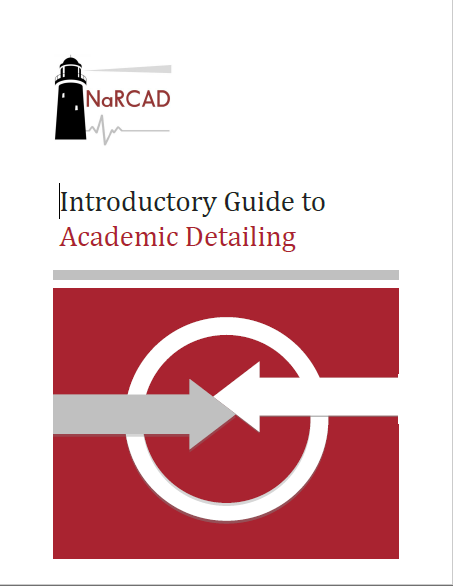 The National Resource Center for Academic Detailing (NaRCAD) operates out of the Boston Medical Center and is the only national technical assistance and capacity-building resource center for clinical outreach education. Their mission is to increase access to evidence-based, interactive education for front line clinicians. NaRCAD trains and support health educators so they can provide the best tools and resources to clinicians.
The National Resource Center for Academic Detailing (NaRCAD) operates out of the Boston Medical Center and is the only national technical assistance and capacity-building resource center for clinical outreach education. Their mission is to increase access to evidence-based, interactive education for front line clinicians. NaRCAD trains and support health educators so they can provide the best tools and resources to clinicians.
NaRCAD emphasizes that busy clinicians need an accurate, ongoing source of current data about the comparative effectiveness, safety, and cost of treatments. Researching and critically examining the most up-to-date evidence on a particular topic area, such as opioid stewardship, can be incredibly challenging and so often clinicians are unaware if better alternatives exist for prescribing, prevention, screening, and patient education. NaRCAD provides training for academic detailers to meet with clinicians to assess individual needs, and needs of the practice and offer tailored, evidence-based clinical recommendations.
RxFiles is an academic detailing program based in Saskatoon, Canada. They were the pioneers in the academic detailing approach. They seek to assist pharmacists, physicians and other health care professionals in obtaining excellent and objective drug information and implementing it into practice.
RxFiles Campaigns related to opioid stewardship:
- Tapering Opioids – How to Explore and Pursue the Option for Patients who Stand to Benefit – Spring 2018
Includes:- background evidence & considerations
- an opioid tapering template with sample tapering schedules
- sample prescription for managing opioid withdrawal
- the subjective opioid withdrawal scale
- motivational interviewing patients: guidance, tips for discussions & sample script
- opioid tapering information for patients
- Opioids – Questions about opioids and the answers that may surprise you – A booklet for people who may benefit from reducing or stopping their opioid
A booklet that pharmacists can use when discussing opioid tapering with patients - Pain Management & Opioids – Addressing Important Challenges and Introducing a Chronic Pain & Opioids Mini-Book – Fall 2017
 Wisconsin Health System Example: In 2021, the pharmacy team at a Wisconsin health system used a multipronged strategy to implement an opioid stewardship initiative. First, they developed a continuing education (CE) presentation and materials on various topics, such as naloxone and opioid and benzodiazepine co-prescribing. Second, they used these materials in combination with a pharmacist-provider academic detailing approach.
Wisconsin Health System Example: In 2021, the pharmacy team at a Wisconsin health system used a multipronged strategy to implement an opioid stewardship initiative. First, they developed a continuing education (CE) presentation and materials on various topics, such as naloxone and opioid and benzodiazepine co-prescribing. Second, they used these materials in combination with a pharmacist-provider academic detailing approach.
duration:
00:02:24
Listen to Audio Clip
How a pharmacy-led opioid stewardship team used academic detailing for pharmacist-provider education at 8 rural clinics
Clip from Podcast with Nicole Green, Director of Ambulatory Pharmacy Services, and Dan Cunningham, Ambulatory Care Clinical Pharmacist at ThedaCare
(00:29:11)
Listen to Podcast
Full Interview with with Nicole Green, Director of Ambulatory Pharmacy, and Dan Cunningham, an Ambulatory Care Clinical Pharmacist at ThedaCare, discussing:
- pharmacy team’s development of CE material (e.g., handouts, presentation, etc.) to be used during pharmacist to provider academic detailing
- details about how a pharmacist used an academic detailing approach with providers at 8 clinics in their rural service areas, and
- advice for pharmacist colleagues in rural areas who are interested in implementing a similar academic detailing approach
What is an example of a Wisconsin health system pharmacy team educating providers and frontline staff about opioid stewardship?
A pharmacist-led academic detailing initiative in 8 rural Wisconsin clinics to educate medical staff about opioid stewardship
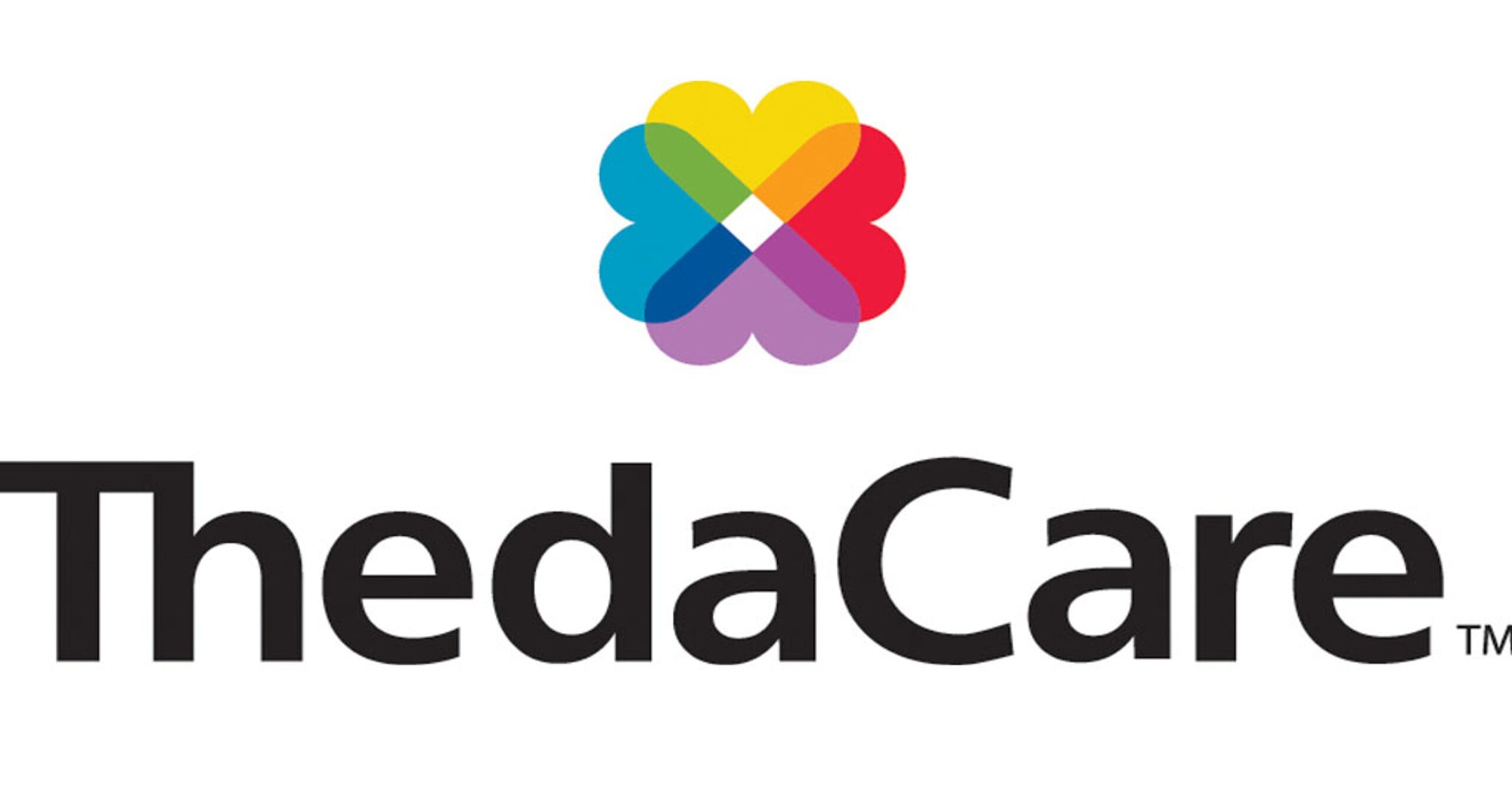
Description:
- Interview with Nicole Green, Director of Ambulatory Pharmacy Service, and Dan Cunningham, Ambulatory Care Clinical Pharmacist, at ThedaCare:
- describing the pharmacy team’s development of CE material (e.g., handouts, presentation, etc.) to be used during pharmacist to provider academic detailing
- providing details about how a pharmacist used an academic detailing approach with providers at 8 clinics in their rural service areas
- offering advice for pharmacist colleagues in rural areas who are interested in implementing a similar academic detailing approach
What continuing education courses are available for pharmacists to learn more about opioid stewardship?
 There are several opioid-related continuing education resources available from the Pharmacy Society of Wisconsin (PSW):
There are several opioid-related continuing education resources available from the Pharmacy Society of Wisconsin (PSW):
- PSW’s Opioid Academy: A Limited CE Webinar Series
- PSW Naloxone CE Webinar
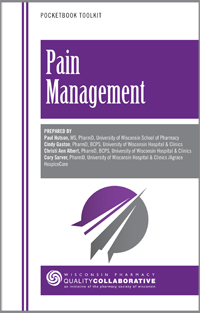 PSW Clinical Pocketbook Toolkit on Pain Management
PSW Clinical Pocketbook Toolkit on Pain Management
This toolkit can be purchased – $20 for non-members $10 for PSW members.- PSW Pain Stewardship Group:
This networking group is for PSW members to collaborate, network, and enhance the effectiveness of pain management efforts across the state of Wisconsin by creating an interactive community of committed pharmacy professionals who:- Share expertise, best practices, and strategies aimed at optimizing pain stewardship
- Work together to design innovative safeguards and impactful approaches to address pain management challenges of common interest
- Identify opportunities to collaborate on broader pain stewardship initiatives and, when appropriate, promote standardization
PSW members can join the Pain Management Stewardship Group by logging into the PSW Network to access the Zoom call-in information. Zoom calls are held on the second Tuesday of every month from 3:00 – 4:00 pm.
Questions about these resources can be directed to info@pswi.org.
American Society of Health-System Pharmacists (ASHP)
Two additional fee-based opportunities for pharmacists to learn more about pain management and/or opioid stewardship are offered by the American Society of Health-System Pharmacists (ASHP).
- Pain Management Certificate Program equips pharmacists with the skills to provide optimal pain management for patients suffering from chronic pain.
- This self-guided, online program will provide 21.5 hours of ACPE continuing education for pharmacists.
Activity Fee: $445.00/$545.00 member/non-member - The 9 modules are designed for participants to increase the knowledge and skills necessary to provide patient-centered pain management. The curriculum addresses basic principles associated with pain pathogenesis and assessment, effective pharmacologic and non-pharmacologic treatment options, and appropriate therapeutic regimens. The course further concentrates on acquiring advanced knowledge about managing pain associated with specific disease states most often encountered in practice. Upon completing all the modules, participants should be proficient in assessing pain and identifying pharmacologic and non-pharmacologic treatment options based on disease states and other patient-related factors.
- This self-guided, online program will provide 21.5 hours of ACPE continuing education for pharmacists.
- Opioid Stewardship Certificate Program
- This self-guided, online program will provide 22 hours of ACPE continuing education for pharmacists, incorporating recorded presentations, readings, and practice activities.
Activity Fee: $445.00/$545.00 member/non-member - This certificate delves into methods for developing an opioid stewardship program from its infancy through maturity and quality improvement. This includes strategies for creating executive leadership support and practitioner buy-in, using data and metrics to inform program development, quality improvement, and management, methods for educating the healthcare team and patients, and patient care strategies that identify and mitigate risks while incorporating shared decision-making with patients and/or caregivers. Upon completion of this program, participants should be proficient in methods of developing opioid stewardship programs that identify opportunities for improvement available at their institution, encourage safe prescribing of opioids, and reduce opioid-related adverse events.
- This self-guided, online program will provide 22 hours of ACPE continuing education for pharmacists, incorporating recorded presentations, readings, and practice activities.
The American Pharmacists Association (APhA) Opioid-Related Training and Webinars
APhA offers a collection of training, webinars, and learning archives, including Pathways to Safer Opioid Use (free, CPE credit), an immersive, interactive training tool designed using opioid-related recommendations. Other resources discuss topics such as abuse deterrent formulations, care of patients with addiction, naloxone, and the role of pharmacy in opioid therapeutics. Continuing education credit is available for some of the training listed.
What continuing education courses are available for prescribers and other clinical staff to learn more about opioid stewardship?
There are numerous opportunities for providers and other clinicians to learn more about opioid stewardship. It is important for pharmacists involved in opioid stewardship initiatives to be aware of these educational opportunities so that they can provide prescribers and other medical staff suggestions and guidance for enhancing their knowledge about opioid stewardship.
It is important for pharmacists to be aware that in Wisconsin, physicians with a Drug Enforcement Administration number are required to complete 2 CME credits related to opioid prescribing. While there is not a corresponding requirement for pharmacists from the Pharmacy Examining Board, pharmacy teams can refer to this requirement when presenting to health system leadership about the rationale for opioid stewardship and the role they can potentially play in pharmacist-delivered provider education.
 The Wisconsin Medical Examining Board (MEB) approved a rule requiring physicians with a Drug Enforcement Administration number to complete two CME credits related to its Opioid Prescribing Guideline during each CME cycle.
The Wisconsin Medical Examining Board (MEB) approved a rule requiring physicians with a Drug Enforcement Administration number to complete two CME credits related to its Opioid Prescribing Guideline during each CME cycle.
- To assist physicians in identifying educational courses to meet the requirements, the Wisconsin Medical Society developed a series of on-demand webinars designed to address the challenges faced by physicians and other prescribers and to improve opioid prescribing practices without compromising the quality of patient care.
- The MEB also provides a list of other approved opioid prescribing courses.
- The Wisconsin Department of Health Services provides a list of resources and information to help all health professionals prevent misuse, provide quality treatment and recovery services, and reduce death and harm. This includes both state and national trainings.
Table 1 lists additional opioid-related continuing education resources. Some are geared towards prescribers, but others apply more broadly to all licensed medical staff. Many of these are available for free.
| Table 1. National organizations offering opioid-related education for health professionals | |
|---|---|
| Centers for Disease Control and Prevention (CDC) Interactive Training Series for Healthcare Providers | Interactive online training series to help healthcare providers apply CDC’s recommendations in clinical settings through patient scenarios, videos, knowledge checks, tips, and resources. |
| Substance Abuse and Mental Health Services Administration (SAMSHA) | Providers Clinical Support System (PCSS) trains health professionals to provide effective, evidence-based, medication-assisted treatments to patients with opioid use disorder in primary care, psychiatric care, substance use disorder treatment, and pain management settings. Includes 700+ educational resources at no cost for prescribers of opioids and other health professionals. |
| National Institute on Drug Abuse (NIDA) | CME/CE courses on topics related to opioid and substance use disorders and addiction, including: stigma, opioids, opioid overdose, and opioid prescribing & pain. |
| US Health and Human Services (HHS) | Guide for Clinicians on the Appropriate Dosage Reduction or Discontinuation of Long-Term Opioid Analgesics provides specific guidance, compiled from published guidelines and from practices endorsed in the peer-reviewed literature. |
| Veterans Health Administration (VA) | Compilation of opioid-related educational resources, toolkits, and videos for providers |
| Project ECHO (Extension for Community Healthcare Outcomes) | Project ECHO is a collaborative model of medical education and care management that helps clinicians provide expert-level care to patients wherever they live. It increases access to specialty treatment in rural and underserved areas using video-conferencing technology to train, advise, and support primary care providers. |
| Project ECHO in Wisconsin | Wisconsin’s ACCEPT (Addiction and Co-morbid Conditions: Enhancing Prevention and Therapeutics) Project ECHO® connects addiction medicine experts with health care providers to improve treatment for patients with a substance use disorder. |
Why is it important for pharmacists to educate patients about opioid stewardship?
Oftentimes a short-term, relatively simple opioid stewardship activity is for pharmacists to provide opioid-related education to patients. This aligns with pharmacists’ roles related to ensuring patient safety by discussing potential risks associated with opioid medications and ensuring that the patient is knowledgeable about safe handling and storage.
In 2018 & 2019, the Joint Commission released new and revised Pain Assessment and Management Standards for hospitals, critical access hospitals, and ambulatory care organizations. Each standard has a similar new requirement that these organizations must educate patients and families on pain management and opioid safety.
Requirement – EP8: The hospital educates the patient and family on discharge plans related to pain management including the following:
Pain management plan of care; Side effects of pain management treatment; Activities of daily living, including the home environment, that might exacerbate pain; or reduce effectiveness of the pain management plan of care, as well as strategies to address these issues; Safe use, storage, and disposal of opioids when prescribed
During the discharge process, patients and families need education on the importance of how to manage the patient’s pain at home. Unmanaged pain may cause a patient to regress in their recovery process or have uncontrolled pain at home leading to a readmission to the hospital. It is necessary to have a discussion with patients and their families regarding their home environment and activities of daily living that may increase the need for pain management. When a patient is being discharged with an opioid, medication education on safe use, including when and how much medication to take, should be included in the discharge plan. Opioid disposal education is also critical in order to both reduce diversion and decrease the risk of accidental exposure to someone other than the person for whom the opioid was prescribed. (Joint Commission)
How can pharmacists educate patients and families about opioid stewardship?
Pharmacists working in health systems have an important role to play in supporting patient education related to opioids. A 2019 study summarized the current involvement and impact of pharmacists in helping to address the crisis identifying ways that pharmacists can educate patients, including:
- Provision of medication reviews and/or medication therapy management
- Provision of counseling and education on appropriate pain (including opioids) management, which should:
- Be verbal and written, with consideration given to health literacy level of patient
- Use educational methods such as Teach-Back
- Address safe storage and disposal of opioids, for example, drug take-back programs
- Extend to family members/friends/support persons as deemed appropriate
In a 2020 publication focused on opioid stewardship measurement, the American Hospital Association (AHA) highlighted how patient and caregiver engagement and education can contribute to opioid stewardship efforts and promote shared decision-making about pain management.
AHA considerations related to patient and caregiver education about opioids:
- Educational materials for patients and caregivers must be revised frequently so they are consistent with the current best practices.
- Messaging in educational materials must be consistent with what providers are sharing with patients.
- Written materials should be reviewed by patient representatives or patient education department to identify stigmatizing language or difficult medical jargon.
- Patient education is important for shared decision-making conversations between providers and patients
There are several existing patient education materials available, which a pharmacist could use as is or modify as needed.
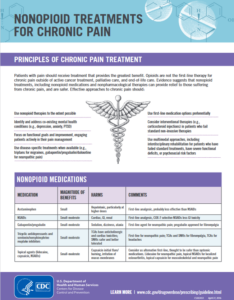 The Centers for Disease Control and Prevention (CDC) offers a collection of patient and caregiver educational materials in printable PDF handouts, posters or videos in both English and Spanish on the following topics:
The Centers for Disease Control and Prevention (CDC) offers a collection of patient and caregiver educational materials in printable PDF handouts, posters or videos in both English and Spanish on the following topics:
- Know Your Options – Nonopioid Treatments for Chronic Pain
- Prevent Opioid Misuse
- Expectations for Opioid Therapy
- Patients’ Frequently Asked Questions
- Helpful Materials for Patients – offers several printable PDF handouts and posters, including:
- Opioid overdose tip card – Preventing an opioid overdose Know the signs
- Patient Factsheet: Promoting Safer and More Effective Pain Management
- Opioid factsheet – Prescription Opioids: What you need to know
- Guidelines Patient Poster – Know the Risks
The National Institute on Drug Abuse (NIDA) provides several resources that could be used in patient education.
- Medications for Opioid Overdose, Withdrawal, & Addiction – This infographic shows the different types of medications prescribed for opioid overdose, withdrawal, and addiction.
- Naloxone DrugFacts – Seven-page PDF providing expert information about naloxone.
The U.S. Department of Veterans Affairs (VA) published a patient information guide on the Safe and Responsible Use of Opioids for Chronic Pain: A Patient Information Guide. While some of the information and resources are specific to the VA, most of the content could be adapted or incorporated into materials for all patients.
 The Wisconsin Department of Health Services has a Dose of Reality: Together We Can Prevent Opioid Harm campaign to inform the public about opioid related harms and encourage families and communities to have open and honest conversations about opioids. Some of this information may be useful to incorporate into patient and caregiver education. For example, the WI DHS offers information about:
The Wisconsin Department of Health Services has a Dose of Reality: Together We Can Prevent Opioid Harm campaign to inform the public about opioid related harms and encourage families and communities to have open and honest conversations about opioids. Some of this information may be useful to incorporate into patient and caregiver education. For example, the WI DHS offers information about:
- Safe Disposal of Medications and Medical Supplies
- Opioid Overdose – information about recognizing an overdose and how to respond
- Safer Use – Information about Naloxone and where it can be obtained
How can pharmacists educate the communities they serve about opioid stewardship?
The opioid epidemic affects patients, families, and entire communities who have experienced the harms associated with opioid misuse. Pharmacists have an opportunity to educate the communities that their health system serves about the safe use of opioids.
Three Strategies for educating the community
1. Share with the community what the health system is doing related to opioid stewardship
One approach to educating the community is for pharmacists to share information about their health system’s opioid stewardship initiatives with the community. This can be done using low-cost strategies such as:
- interviews on local radio or television
- through editorials or information stories in local newspapers, and
- through social media channels
The American Hospital Association (AHA) emphasizes that by informing the community about their commitment to opioid stewardship, pharmacists, and the health systems they represent, are educating the public about important opioid safety information and contributing to changing the public perception about appropriate pain management and opioid use. (AHA, 2020)
2. Seek out and participate in community activities and develop partnerships
Another approach to educating the community is for pharmacists to seek out and participate in community-based opportunities, which can facilitate the development of partnerships with community organizations who seek to prevent and reduce opioid harms. The American Hospital Association notes that by engaging with the community, the pharmacist (and the health system they represent) aligns ideas and goals of the health system with supportive efforts in the community, such as from the health departments, or in local jurisdictions (Police, EMT, etc.). (AHA, 2020)
3. Become familiar with opioid-related resources developed by community-based organizations
County and municipal public health departments often have publicly-available opioid-related material that has already been created and can be used by pharmacists in educational outreach across the community.
For example, some rural Wisconsin counties have developed opioid-related resources for the public:
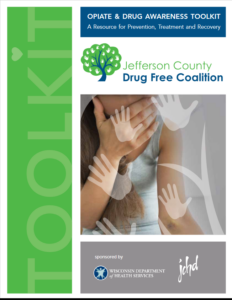
- Jefferson County Drug Free Coalition and partners developed the Opiate & Drug Awareness Toolkit as a resource for prevention, treatment and recovery. This comprehensive booklet provides valuable information for community members.
- Sauk County Health Department offers several resources related to naloxone and treatment for opioid use disorder:
Module 8 presents more information about how pharmacists can explore potential partnerships with local opioid-related coalitions.
Another potential resource for pharmacists interested in organizing educational opportunities for the communities their health system serves are two opioid-related programs offered by Wisconsin Health Literacy.
 Wisconsin Health Literacy is a non-profit organization that raises awareness about health literacy and offers training and consulting services, which can be customized to meet organizational needs. Two programs they offer are related to opioid stewardship. Pharmacists working on opioid stewardship could explore whether these programs are something the health system could provide for patients and caregivers.
Wisconsin Health Literacy is a non-profit organization that raises awareness about health literacy and offers training and consulting services, which can be customized to meet organizational needs. Two programs they offer are related to opioid stewardship. Pharmacists working on opioid stewardship could explore whether these programs are something the health system could provide for patients and caregivers.
Let’s Talk About Pain Medicines
WHL developed a project called Let’s Talk About Pain Medicines, a 90-minute interactive workshop to help adults throughout Wisconsin learn how to more safely and effectively use prescription pain medicines. WHL is partnering with community organizations across the state to deliver workshops on the following topics:
- The differences between prescription opioids and other pain medicines
- Safe storage of opioid pain medicine to help prevent others from finding and using them
- What to do with unused opioid pain medicines (i.e.: where and how to get rid of them when no longer needed so they are out of the home)
- Understanding of label directions (when and how long to take the medicine)
- Special instructions on warning labels
- Illegality of using others’ medications
- When to call the pharmacist or provider
- History of opioids and the opioid crisis
- Use of naloxone and signs of opioid overdose
Each participant receives an easy-to-understand lesson booklet, provided in English and Spanish. In addition, participants will receive a drug deactivation kit and other informational materials, including 4 fact sheets on:
- How are prescription opioids and other pain medicines different?
- How to keep opioids safe and how to get rid of unused medicines
- What can go wrong when you use opioid medicines?
- Opioid resources: treatment, recovery and community resources
Let’s Talk About Opioids
Wisconsin Health Literacy (WHL) partnered with 5 justice-involved facilities to develop a curriculum, Let’s Talk about Opioids, to help justice-involved individuals understand the risks of opioid overdose upon release from prison or parole, as well as resources available for alternate treatment.
Download Let’s Talk About Opioids toolkit
By prioritizing opioid stewardship, health systems are contributing to addressing the opioid crisis across the communities they serve. Such partnerships strengthen the response to opioid harms across the community and can provide benefits for health systems, such as promoting positive name recognition in the community, and for non-profit hospitals, it contributes to the required community needs assessment reports related to their tax-exempt status (see Module 2). Module 8 delves deeper into this topic of health system pharmacists/opioid stewardship teams partnering with the communities they serve to complement and strengthen the community-wide response to the opioid crisis.
